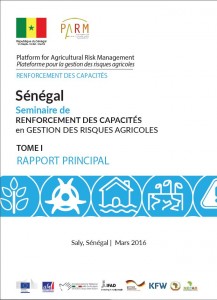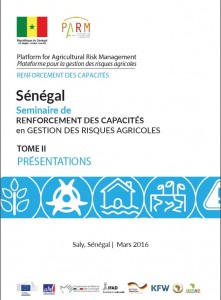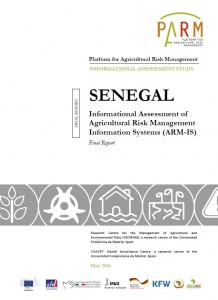
PARM held a successful Capacity Development Seminar in Saly, Senegal, to strengthen the holistic agricultural risk management (ARM) approach in the country, and to exchange views on the prioritization of agricultural risks according to the main national stakeholders. In Dakar, a technical discussion brought together national and international experts on Agricultural Risk Management Information Systems.
Saly, 1 April 2016 – Senegal faces many agricultural risks, ranging from erratic rainfall to floods, grasshopper outbreaks, and price volatility. These risks affect farmers livelihoods, preventing them from reaching better living conditions, more stable incomes, and the ability to plan ahead. How can farmers reduce them? With such a vast array of risks overlapping and sometimes reinforcing one another, it is crucial to look at all risks through a holistic approach, taking into account each risk individually, but also risks taken together and their links. In doing this, risk identification and prioritization are paramount. In late March, the PARM team set out to Senegal to exchange with national stakeholders during a Capacity Development Seminar and a technical discussion on Information Systems.
Capacity Development Seminar
On 30 March 2016 and 1 April 2016, PARM organized its first Capacity Development Seminar in Senegal, in partnership with NEPAD and the Ministry of Agriculture. The Seminar took place in Saly and brought together over 50 high-level national stakeholders from government agencies, the private sector, and farmers organizations.
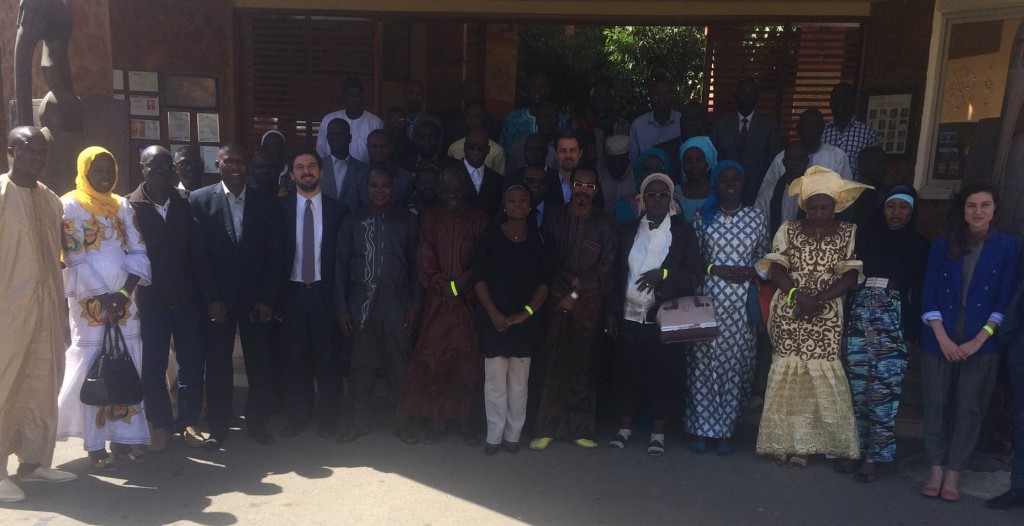
Participants in the Capacity Development Seminar held in Saly, Senegal on 31 March- 1 April 2016.
Objectives and programme of the Seminar
Over two days, the Seminar gave participants an introduction to the topic of agricultural risk management and its application in Senegal, through a mix of presentations by the PARM team and by national stakeholders, and through group discussions and analysis of specific sectoral issues.
The general objectives of the Seminar were to enable participants to:
- Enhance their skills in Agricultural Risk Management and understand the holistic approach to Agricultural Risk Management
- Elaborate key concepts in ARM and use them to identify and analyse risks in agriculture
- Gain a first introduction to risk assessment methods ans specific risk assessment tools available nationally.
During the first day, participants learned about the holistic agricultural risk management approach, and the methodology for rigorous risk assessments. Following the morning presentations, participants were able to define risks and their typologies, identify the different sources of risks, the severity of risks, the layers of risks and of responsibilities in agricultural risk management. They learned how to prioritize risks based on their severity and frequency. After an interactive session based on a quiz of the morning’s presentations, participants formed groups based on their sector of expertise (livestock, fisheries, agriculture) to discuss their specific risks and risk management strategies.
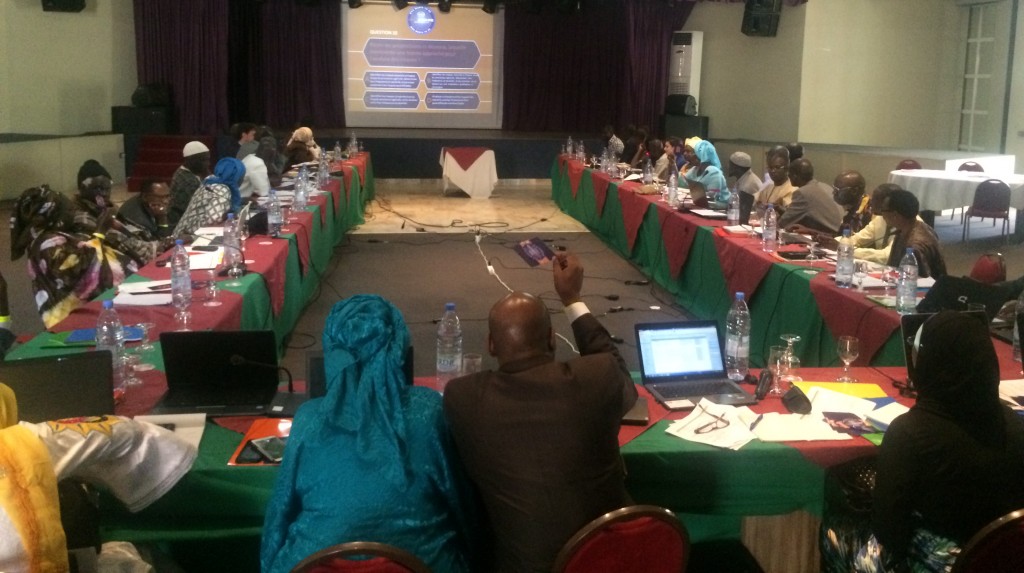
Participants competing in the “Who want s to be ARM-Aware?” quiz.
On Day 2, the PARM team presented an overview of existing tools to manage agricultural risks, before leaving the floor to representative from government agencies; local research centers and private sector actors to present specific tools available in Senegal, including contract farming, agricultural insurance, commodity exchanges, information systems and warehouse receipts. Participants then spent the afternoon in groups discussing their knowledge, access to the tools available and how to better include them in their daily activities.
Further needs for Capacity Development
This workshop was also an opportunity to exchange with participants on their needs for training, so as to design a tailored approach to equip them with the most appropriate knowledge and tools to manage agricultural risks in their daily work. The PARM team was able to collect feedback from all participants, and this will inform their work on building a comprehensive capacity development strategy for Senegal, with the view of training key stakeholders who will be able to spread the knowledge and help the information trickle down.
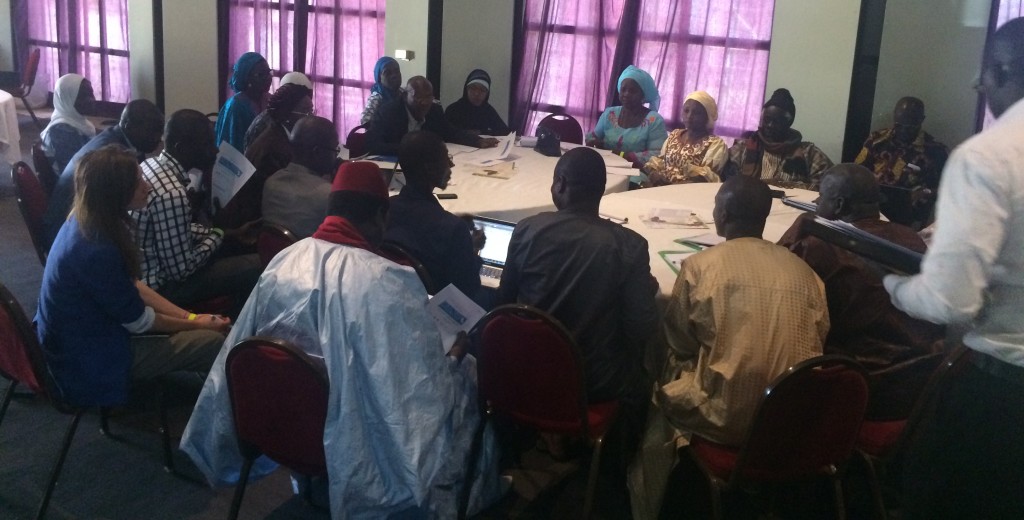
National stakeholders engaged in group discussions on specific agricultural risk management issues.
Technical meeting on Information Systems for Agricultural Risk Management
PARM has been working in partnership with the Research Centre for the Management of Agricultural and Environmental Risks (CEIGRAM) on a study to assess the available agricultural risk management information systems (ARM-IS) in several African countries, among which Senegal.
The resulting Senegal Country Report will outline the availability and quality of information for agricultural risk management purposes, focusing both on the existence, quality and useful access of the available information, as well as on the gaps in information and access tools for the main stakeholders.
On 30 March 2016, PARM organized a technical meeting in Dakar, to enable CEIGRAM to discuss their draft report national experts. The objective of this meeting was to integrate feedback from a wide range of Senegalese experts into the report, so as to make it the most useful for local stakeholders.
Next Steps
Following this successful event, PARM will develop a complete Capacity Development Strategy for Senegal, in close partnership with the Ministry of Agriculture and NEPAD. Tailored trainings will be delivered throughout the year to key stakeholders so as to further build capacity on this crucial topic.
Based on the outcomes of the technical discussion, the study on Agricultural Risk Management Information Systems will be further improved before publishing.
Resources
Senegal Capacity Development Seminar Report – Volume I: Main Report (FR)
Senegal Capacity Development Seminar Report – Volume II: Presentations (FR)
Informational Assessment of Agricultural Risk Management Information Systems in Senegal (EN)
